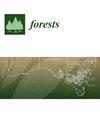哥伦比亚西部季节性干旱热带森林中木材腐朽真菌 Phellinotus teixeirae 的系统发育多样性、寄主特异性和分布情况
IF 2.4
2区 农林科学
Q1 FORESTRY
引用次数: 0
摘要
黄柏属(多孔菌科)是热带和亚热带地区常见的一种木材腐朽真菌,是季节性干旱热带森林(SDTF)生物群落的特有种。然而,尽管黄柏是活树木的主要威胁,但其多样性仍未得到探索。因此,本研究旨在通过形态学和分子数据确认和描述来自濒危的哥伦比亚 SDTF 生物群落的 Pithecellobium dulce(豆科)树木(当地称为 "Chiminango")中的第一批茶黄柏真菌分离物。从城市地区和山谷大学校园中活的 P. dulce 树上采集了 15 个真菌标本,并根据分类描述将其归类为 P. teixeirae。系统发育关系由四个基因组数据集(核糖体和基因编码区)推断,其中包括 82 个分类群,涵盖 3991 个核苷酸位点。该分析发现了 "Phellinotus 支系 "中七个高度支持(>90% bootstrapping)的单系类群,并确认了 P. teixeirae 的新分布范围(100% bootstrapping 支持),即在新热带地区向北延伸约 1000 公里。分层分子变异分析(AMOVA)提供了物种之间的明显遗传差异(70%的变异,p 值 = 0.001)和物种内部原产国之间的低差异(11%,p 值 = 0.044)。主成分判别分析(DAPC)显示了包括近缘物种在内的复杂聚类,这可能是近期辐射和物种边界薄弱的信号。中位连接单倍型网络分析发现了独特的单倍型,这可能与新宿主定殖和种群扩张有关(Tajima's D ≤ -0.5)。总之,本研究首次评估了 P. teixeirae 在新的地理环境(SDTP)和寄主树(P. dulce)中的遗传多样性。然而,要进一步了解该属的分布模式和遗传多样性的驱动因素,增加分离株的数量仍然至关重要。本文章由计算机程序翻译,如有差异,请以英文原文为准。
Phylogenetic Diversity, Host Specificity, and Distribution of the Wood-Decaying Fungus Phellinotus teixeirae in Western Colombia’s Seasonally Dry Tropical Forest
Phellinotus (Polyporales) is a common genus of wood-decay fungi in tropical and subtropical areas, endemic to the Seasonally Dry Tropical Forest (SDTF) biome. However, Phellinotus diversity remains unexplored, despite being a major threat to living trees. Therefore, this study is aimed at confirming and characterizing through morphological and molecular data the first isolates of Phellinotus teixeirae in Pithecellobium dulce (Fabaceae) trees (locally referred to as ‘Chiminango’) from the endangered Colombian SDTF biome. Fifteen fungal specimens were recovered from living P. dulce trees, in the urban area and at the Universidad del Valle campus, and classified as P. teixeirae based on taxonomical descriptors. Phylogenetic relationships were inferred from a four-loci dataset (ribosomal and gene-coding regions), including 82 taxa covering 3991 nucleotide positions. The analysis recovered seven highly supported (>90% bootstrapping) monophyletic taxa of the ‘Phellinotus Clade’, and confirmed the new distribution range of P. teixeirae (100% bootstrap support), which extends approx. 1000 km north in the Neotropics. Hierarchical stratified Analysis of MOlecular VAriance (AMOVA) provided a clear genetic distinction between species (70% of variation, p-value = 0.001) and low differentiation among country of origin within species (11%, p-value = 0.044). Discriminant Analysis for Principal Components (DAPC) indicated complex clustering including closely related species, probably a signal of recent radiation and weak species boundaries. Median-joining haplotype network analysis identified unique haplotypes, which may correlate with new host colonization and population expansion (Tajima’s D ≤ −0.5). In conclusion, this study provides the first assessment of the genetic diversity of P. teixeirae in a novel geography (SDTP) and host tree (P. dulce). However, increasing the number of isolates remains critical to understand further the genus’ distribution patterns and drivers of genetic diversity.
求助全文
通过发布文献求助,成功后即可免费获取论文全文。
去求助
来源期刊

Forests
FORESTRY-
CiteScore
4.40
自引率
17.20%
发文量
1823
审稿时长
19.02 days
期刊介绍:
Forests (ISSN 1999-4907) is an international and cross-disciplinary scholarly journal of forestry and forest ecology. It publishes research papers, short communications and review papers. There is no restriction on the length of the papers. Our aim is to encourage scientists to publish their experimental and theoretical research in as much detail as possible. Full experimental and/or methodical details must be provided for research articles.
 求助内容:
求助内容: 应助结果提醒方式:
应助结果提醒方式:


